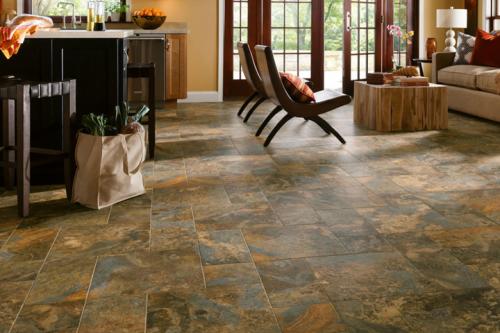Advantages of Travertine Flooring To Add Value To Your Home

If you are looking to add great value to your home then considering travertine tiles to add that spice of elegance and beauty. Travertine floors are made from the majestic natural stone and offer incredible depth and color, adding a great aesthetic appearl to your home. Travertine flooring has its advantages and limitations. Understanding your lifestyle, needs and preferences are key to ensuring that the function of this flooring option is fully maximized for your home.
So what exactly is travertine?
Travertine flooring is made from travertine, a type of limestone that forms through mineral deposits, particularly in and around hot springs. Travertine limestone is composed of calcium carbonate, the same material that makes stalactites and stalagmites.
Travertine tiles have been used for many years not just for its durability but also for its looks and texture. The Romans, for example, built many of their famous buildings using travertine. A notable example is the Colosseum, a building made mostly from the material and has remained as one of the most enduring landmarks in Italy. It is also commonly found in some of the world's oldest buildings.
So what are the advantages of travertine flooring?
Travertine flooring is quite durable and with sufficient care, it can last for many years and maintain its beauty. When sold, the material is usually displayed with a mark indicating its hardness on the MOH scale. In general, travertine registers at the MOH scale with a 3-4 rating, which is near or equivalent to that of marble. As long as it is sealed, treated and cared for, it can withstand regular foot traffic plus lots more.
If your flooring is not sealed and installed in its rough form, it offers excellent traction. This is why a travertine paver is safer to use than ceramic tiles outdoors in the garden or patio. Travertine also comes in several colors such as beige, white or ivory, brown, red and gold so tiles can be matched to a preferred color scheme. It is also processed and sold in different finishes such as chiselled, brushed, tumbled and honed.
What are the disadvantages of travertine flooring?
Travertine flooring is made out of natural limestone. If it is unsealed, it can be damaged or stained by high-acid products because it is by nature porous. Travertine is alkaline and will react when it comes in contact with acids from liquids and foods. It can also be damaged over time due to corrosion if cleaned using acid-based products. It also tends to be rather slippery when wet, especially if it is polished.
This type of flooring is also a high-end construction material and as such, tends to be priced at a premium. It is possible it can be as expensive as granite tiles or even more. Travertine flooring also behaves similarly to other natural stone materials in that it can chip or break and is vulnerable to scratching. It also tends to be quite heavy, particularly the larger 12"x12" tile units, which can weight as much as 2.5kgs.
Travertine flooring also requires regular care and maintenance and may not be the best option in homes where there are kids and/or pets if it is unsealed. Very often you'll find that it is used more often in the patio and living room areas and occasionally in the kitchen or bathroom.
Advertise on APSense
This advertising space is available.
Post Your Ad Here
Post Your Ad Here
Comments